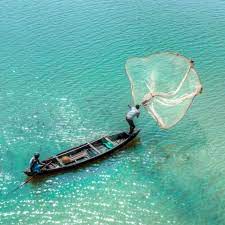Dr. Nazia Sher
World Fisheries Day (WFD) is celebrated globally on November 21 since 2015. On World Fisheries Day 2023, individuals, communities, and organizations worldwide are encouraged to take action. This may include participating in local events, organizing educational programs, or supporting initiatives that promote sustainable fisheries and the well-being of fishing communities.
As per the Economic Survey (2022-23), the fisheries sector in Pakistan demonstrated commendable growth, with a sectoral expansion of 1.44%, a notable rise from the previous year’s 0.35%. In the fiscal year 2023, the overall fish production reached 700,000 metric tons, comprising 475,000 MT from marine sources and 225,000 MT from inland sources. This marks a modest 0.6% increase compared to the preceding year, where marine and inland productions were 468,000 MT and 228,000 MT, respectively. At the core of this progress are the fishing communities, encompassing over 300,000 individuals reliant on various fishing activities for their livelihoods.
These communities go beyond economic contributions, acting as custodians of a heritage intricately connected to marine life and serving as the social and economic pillars of coastal regions. Noteworthy is Pakistan’s strategic utilization of the export potential in its fisheries sector in recent years, with a consistent uptrend in seafood and fish product exports.
The theme “Developing Fishing Communities” resonates with Pakistan’s Sustainable Development Goals (SDGs). By empowering these communities, it directly addresses SDG 1 (No Poverty) and SDG 8 (Decent Work and Economic Growth), contributing to economic well-being. The emphasis on education aligns with SDG 4 (Quality Education) while promoting alternative livelihoods supports SDG 12 (Responsible Consumption and Production). Moreover, the focus on stewardship is in harmony with SDG 14 (Life Below Water), underscoring the significance of preserving marine ecosystems. This theme encapsulates a comprehensive approach to sustainable development, intertwining economic, social, and environmental aspects to ensure the welfare of fishing communities and the conservation of marine resources in Pakistan.
The historical overview of mariculture in Pakistan underscores the intricate relationship with fisherman communities, revealing a sector often overlooked. The decline in oyster culture and sea ranching post-independence impacted coastal communities reliant on marine resources. Challenges faced in finfish and shrimp mariculture projects directly affect fisherman communities, as economic opportunities diminish. The setbacks in crab fattening, once a thriving activity, highlight the vulnerability of these communities. Addressing the overlooked mariculture sector becomes imperative to uplift and sustain the livelihoods of fisherman communities, emphasizing the need for holistic and inclusive development strategies.
Pakistan’s seafood sector achieved a noteworthy $500 million export value in FY 2022-23 but faces challenges, including U.S. and EU bans on shrimp exports impacting 300+ processing units. This sector, contributing 2.01% to agriculture and 0.39% to GDP, is pivotal for the well-being of fishing communities. The bans resulted in closures affecting livelihoods, necessitating comprehensive measures like legal frameworks and infrastructure development. Collaborative efforts are vital for advocacy and responsible fishing practices. A commitment to sustainability by businesses can positively impact the 1% directly employed and 600,000 indirectly benefiting individuals, ensuring long-term prosperity.
Challenges persist in Pakistan’s fisheries sector, underscoring the vulnerabilities faced by fishing communities. The historical decline in traditional practices like oyster culture and sea ranching, coupled with setbacks in mariculture projects, directly impacts the livelihoods of over 300,000 individuals reliant on various fishing activities. Moreover, the recent bans on shrimp exports by the U.S. and EU have exacerbated the situation, leading to closures of more than 300 processing units, posing severe threats to the economic stability of fishing communities.
In essence, NIMA’s strategic advocacy and community-focused initiatives can steer Pakistan’s fisheries sector toward sustainable development, ensuring the well-being of fishing communities. The institute’s pivotal role lies in championing inclusive policies for a prosperous future in the sector.
The writer is associated with the National Institute of Maritime Affairs.







